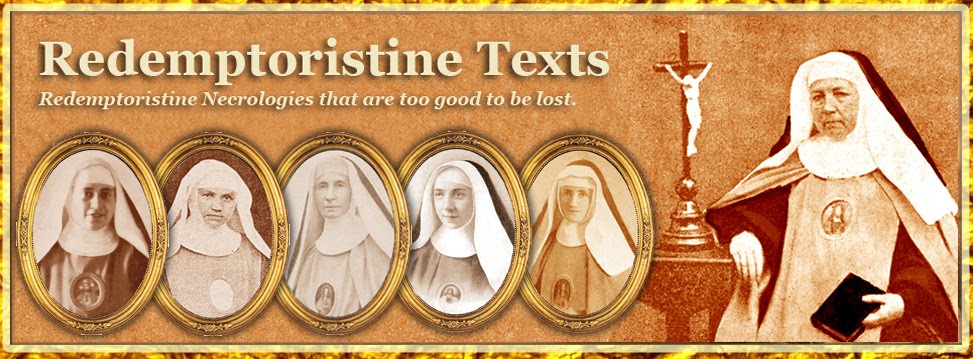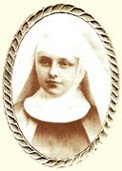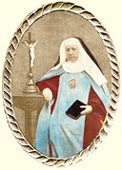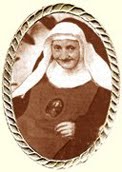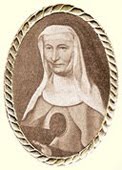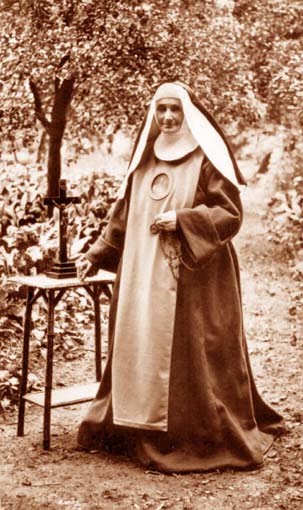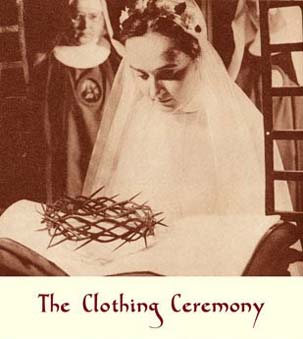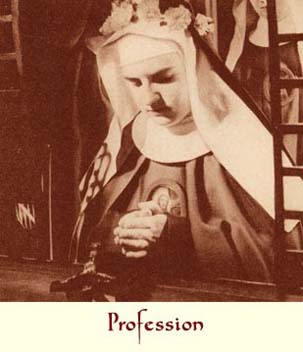Foundress of the Convent of the Redemptoristines of Velp, near Grave, founded in 1858
Chapter IX.
The last illness and precious death
of Mother Marie Cherubine.
The month of April 1887 was coming to an end, when the community was unexpectedly thrown into great trouble. The feebleness of their good Mother had grown to the point that her doctor considered it necessary to have the last sacraments administered to her. Let us now listen to the chronicle of the House:
“The holy ceremony took place in the morning, after the recitation of the Little Hours of the Breviary. The religious were extremely sad. The Reverend Mother was very calm, and her spirit serene. She followed the sacred rite with the greatest piety, joining in all the prayers, and considered us with a look full of benevolence.
“However, the illness took a turn for the better, and on 27th April, the good Mother was out of danger, even though she was still suffering. She had cancer of the stomach, and as far as food was concerned, she could scarcely take anything other than a liquid, and even then with a great deal of difficulty. But her virtue was nothing short of admirable. She was always happy, never letting the least complaint escape her, and she was continually occupied in prayer or meditation. When someone asked her: “My Mother, are you suffering?” she would reply: “Oh, nothing in comparison with what our good Jesus suffered.” Sometimes she manifested her desire to suffer a great deal to please God and to obtain the salvation of immortal souls.
“Fervent prayers were addressed to heaven, and it seemed that God still wished to leave us our good Mother for a while for our happiness and joy. And in fact, we saw our dear invalid at choir during the months of June and July. She took communion and heard Mass with us. Soon her strength permitted her to give us some pious conferences on the strict observance of the Rule, and especially on her preferred subject – charity and mutual support, and on the love of prayer.
“She also exhorted us to always seek our support and strength in God, and ask from Him the courage to bear our daily pains and crosses of every day, with profit for heaven.
“She even attended the recitation of the Divine Office, as she still had her voice and a great zeal for the good order of the choir.
“On 2nd October, the feast of the Holy Angels, the day when the community celebrated Reverend Mother Marie Cherubine’s feast day, the dear invalid still had the strength to come to the recreation room to receive the Sisters’ good wishes.
“One month later, on 6th November, they celebrated the 40th anniversary of her religious profession. The good Mother was still able to talk with her daughters, and ardently spoke of the great happiness of belonging to God, and excited a zeal in them that burned more and more for the service of their heavenly Spouse. It was noticed, however, that her strength was waning. The illness had undermined her constitution and the end was not too far away. So we prepared ourselves to make the sacrifice of our much-beloved Mother, if this was the will of God, as in fact it would be a great sacrifice for us.
“During those same days a very young Sister fell seriously ill, to the point where they had to administer the last sacraments to her. Sister Marie-Julie (this was her name) keenly desired to see her cherished Mother one more time, and she in her turn, although she herself was very ill, could not refuse to console her daughter. So she went to see her and console her by her encouraging words.
“For our good Mother the death of this good little Sister on 21st November was a very painful blow. After this day, all she did was decline, and on 5th December, she received the last sacraments for a second time. The dear invalid was, as always, an admirable model of patience and resignation to the will of God. For each Sister who visited her, she still had some words of encouragement. The 19th December was a day of great suffering and much pain. The doctor and the Sisters did everything they could to calm her down. If sometimes the patient seemed to be out of her mind, her spirit however remained clear and penetrating, and right up to her last moment she showed by signs that she understood everything that was said to her.
“The community confessor, a Reverend Capuchin Father from Velp, came frequently to see the patient. He recited the prayers of the agonising with the Sisters. Sometimes the good Mother would herself make the sign of the cross, and they could hear her saying little ejaculatory prayers in a feeble voice, such as: “My Lord and my God!” or utter acts of charity or abandonment to the divine will.
“Thus the 19th and 20th December passed. In those days, the extraordinary confessor of the House came to visit the dying Mother. He was most edified to see the beautiful and peaceful disposition of the good Mother in her last days.
“On the following day, 21st December, the feast of St. Thomas the apostle, she received Holy communion. This day was to be the last in her life here below. Soon she would receive the crown of the eternal happiness for which she had sacrificed everything else on this earth.
“In the evening, at about 10.15 p.m., her attendant noticed that the end was approaching. For the last time, all the spiritual daughters of Mother Marie Cherubine came and knelt down before her to assist her with their prayers in this last moment, which was so important and solemn. The confessor was also present to give her a last absolution.
“While everyone was entreating the Father of Mercy to welcome her into His eternal home, at about 10.45 p.m., the good Mother Marie Cherubine peacefully rendered her beautiful soul to her Creator. Immediately her features took on an expression of sweet serenity which told all the persons present that the dear Mother was already enjoying the contemplation of the divine Majesty.
“This was truly a case for applying the words of Holy Scripture: “Blessed are the dead who die in the Lord!”
This is how Mother Marie Cherubine went to receive from the hand of God the reward that she had merited because of everything she had done and suffered for Him. As He said Himself: “Whoever leaves her house, her father and mother, brothers and sisters in My name, will receive a hundredfold in the eternal life.”
For twenty nine years, the community of Velp had found in her a Mother full of charity, so it was in no way astonishing that she was wept by all her Sisters and that the love of her daughters followed her to the tomb.
When her body had been reclothed in the red robe, the blue scapular and the mantle of the same colour, the bier was brought into the lower choir. There, the Sisters took turns to come and pray day and night, right up to the moment of the funeral. These days were thus days of prayer for the repose of the soul of the good Mother. And also, adds the chronicles of the community, the Sisters, from their prayers, were able to draw the consolation and strength they needed to make the generous sacrifice that God required from them.
The 24th December 1887 was the day of the funeral. After the chanting of the Libera, the priest celebrating, followed by two acolytes, entered the enclosure to conduct the body to its last resting place. It was carried there by eight of the older Choir Sisters, while the other Sisters followed, chanting the Psalm Miserere.
At the cemetery, when the ordinary ceremonies were completed, her desolate daughters said their farewell to their Mother whom they could never forget, while they waited for the moment when they would be with her again in the beautiful homeland, where she herself would not forget her dear children at Velp.
The following inscription was engraved later on her tomb:
“The holy ceremony took place in the morning, after the recitation of the Little Hours of the Breviary. The religious were extremely sad. The Reverend Mother was very calm, and her spirit serene. She followed the sacred rite with the greatest piety, joining in all the prayers, and considered us with a look full of benevolence.
“However, the illness took a turn for the better, and on 27th April, the good Mother was out of danger, even though she was still suffering. She had cancer of the stomach, and as far as food was concerned, she could scarcely take anything other than a liquid, and even then with a great deal of difficulty. But her virtue was nothing short of admirable. She was always happy, never letting the least complaint escape her, and she was continually occupied in prayer or meditation. When someone asked her: “My Mother, are you suffering?” she would reply: “Oh, nothing in comparison with what our good Jesus suffered.” Sometimes she manifested her desire to suffer a great deal to please God and to obtain the salvation of immortal souls.
“Fervent prayers were addressed to heaven, and it seemed that God still wished to leave us our good Mother for a while for our happiness and joy. And in fact, we saw our dear invalid at choir during the months of June and July. She took communion and heard Mass with us. Soon her strength permitted her to give us some pious conferences on the strict observance of the Rule, and especially on her preferred subject – charity and mutual support, and on the love of prayer.
“She also exhorted us to always seek our support and strength in God, and ask from Him the courage to bear our daily pains and crosses of every day, with profit for heaven.
“She even attended the recitation of the Divine Office, as she still had her voice and a great zeal for the good order of the choir.
“On 2nd October, the feast of the Holy Angels, the day when the community celebrated Reverend Mother Marie Cherubine’s feast day, the dear invalid still had the strength to come to the recreation room to receive the Sisters’ good wishes.
“One month later, on 6th November, they celebrated the 40th anniversary of her religious profession. The good Mother was still able to talk with her daughters, and ardently spoke of the great happiness of belonging to God, and excited a zeal in them that burned more and more for the service of their heavenly Spouse. It was noticed, however, that her strength was waning. The illness had undermined her constitution and the end was not too far away. So we prepared ourselves to make the sacrifice of our much-beloved Mother, if this was the will of God, as in fact it would be a great sacrifice for us.
“During those same days a very young Sister fell seriously ill, to the point where they had to administer the last sacraments to her. Sister Marie-Julie (this was her name) keenly desired to see her cherished Mother one more time, and she in her turn, although she herself was very ill, could not refuse to console her daughter. So she went to see her and console her by her encouraging words.
“For our good Mother the death of this good little Sister on 21st November was a very painful blow. After this day, all she did was decline, and on 5th December, she received the last sacraments for a second time. The dear invalid was, as always, an admirable model of patience and resignation to the will of God. For each Sister who visited her, she still had some words of encouragement. The 19th December was a day of great suffering and much pain. The doctor and the Sisters did everything they could to calm her down. If sometimes the patient seemed to be out of her mind, her spirit however remained clear and penetrating, and right up to her last moment she showed by signs that she understood everything that was said to her.
“The community confessor, a Reverend Capuchin Father from Velp, came frequently to see the patient. He recited the prayers of the agonising with the Sisters. Sometimes the good Mother would herself make the sign of the cross, and they could hear her saying little ejaculatory prayers in a feeble voice, such as: “My Lord and my God!” or utter acts of charity or abandonment to the divine will.
“Thus the 19th and 20th December passed. In those days, the extraordinary confessor of the House came to visit the dying Mother. He was most edified to see the beautiful and peaceful disposition of the good Mother in her last days.
“On the following day, 21st December, the feast of St. Thomas the apostle, she received Holy communion. This day was to be the last in her life here below. Soon she would receive the crown of the eternal happiness for which she had sacrificed everything else on this earth.
“In the evening, at about 10.15 p.m., her attendant noticed that the end was approaching. For the last time, all the spiritual daughters of Mother Marie Cherubine came and knelt down before her to assist her with their prayers in this last moment, which was so important and solemn. The confessor was also present to give her a last absolution.
“While everyone was entreating the Father of Mercy to welcome her into His eternal home, at about 10.45 p.m., the good Mother Marie Cherubine peacefully rendered her beautiful soul to her Creator. Immediately her features took on an expression of sweet serenity which told all the persons present that the dear Mother was already enjoying the contemplation of the divine Majesty.
“This was truly a case for applying the words of Holy Scripture: “Blessed are the dead who die in the Lord!”
This is how Mother Marie Cherubine went to receive from the hand of God the reward that she had merited because of everything she had done and suffered for Him. As He said Himself: “Whoever leaves her house, her father and mother, brothers and sisters in My name, will receive a hundredfold in the eternal life.”
For twenty nine years, the community of Velp had found in her a Mother full of charity, so it was in no way astonishing that she was wept by all her Sisters and that the love of her daughters followed her to the tomb.
When her body had been reclothed in the red robe, the blue scapular and the mantle of the same colour, the bier was brought into the lower choir. There, the Sisters took turns to come and pray day and night, right up to the moment of the funeral. These days were thus days of prayer for the repose of the soul of the good Mother. And also, adds the chronicles of the community, the Sisters, from their prayers, were able to draw the consolation and strength they needed to make the generous sacrifice that God required from them.
The 24th December 1887 was the day of the funeral. After the chanting of the Libera, the priest celebrating, followed by two acolytes, entered the enclosure to conduct the body to its last resting place. It was carried there by eight of the older Choir Sisters, while the other Sisters followed, chanting the Psalm Miserere.
At the cemetery, when the ordinary ceremonies were completed, her desolate daughters said their farewell to their Mother whom they could never forget, while they waited for the moment when they would be with her again in the beautiful homeland, where she herself would not forget her dear children at Velp.
The following inscription was engraved later on her tomb:
In the pious memory
of our Very Reverend Mother
MARIE CHERUBINE OF THE HOLY SPIRIT,
foundress, and, for twenty nine years,
the Superior of this convent,
deceased on 21st December 1887,
at the age of 75 years.
Everything to everyone, she did not live for herself,
But for God and the Sisters
confided to her care.
May she rest in peace!
of our Very Reverend Mother
MARIE CHERUBINE OF THE HOLY SPIRIT,
foundress, and, for twenty nine years,
the Superior of this convent,
deceased on 21st December 1887,
at the age of 75 years.
Everything to everyone, she did not live for herself,
But for God and the Sisters
confided to her care.
May she rest in peace!
And indeed she had been everything to everyone, to gain them all for Jesus Christ.
Like a true Mother, she knew how to direct her house with a skilful hand and showed herself in everything as an excellent Superior. By her gentle direction and her pleasant manner, she gained the affection and esteem of all the Sisters and enjoyed their entire confidence, as one of their directors attests. A Reverend Capuchin Father who for a long time had the spiritual direction of the Convent of Velp has also left us this witness in her favour: “Mother Marie Cherubine has always appeared to me as an excellent religious, a prudent Superior, and remarkable by her wise direction and her great charity, and thus she was loved and esteemed by all her Sisters. I have never heard the least complaint, or detected the least discontent in regard to her. Everyone, on the contrary, sings her praises.”
To finish with, let us take note of a letter addressed to the Sisters of Velp by a priest who later became the Bishop of Surinam – Mons. Wulfingh, who had known Mother Marie Cherubine and appreciated her virtues:
“My Reverend Sisters,
“Your good Mother has thus left you for heaven! Our good God has finally called her to Himself, and she, who during her life, knew only the most perfect obedience and the most generous accomplishment of the will of the Sovereign Master, has responded immediately to the voice that called her. It is assuredly a great loss, that of a Mother who, for so many years, was devoted to the good of the community in general and the wellbeing of each Sister in particular. But it is no less certain that those who truly wish to be saints, have a precious death in the eyes of the Lord: “Pretiosa in conspectu Domini mors sanctorum ejus” [Precious in the sight of the Lord is the death of His saints]. This is very much the case of the dear departed. Her death is for her only the beginning of the true life.
“Indeed, your Mother is dead, but she continues to live amongst you. Her spirit of charity, by which she was truly everything to everyone; her spirit of regular discipline, which made her a model to imitate even by the most fervent; her spirit of generosity, which brought her to sacrifice herself for everyone in general and for each one in particular, and this spirit that excited you to walk in her footsteps along the path she pioneered. She herself goes ahead of you to encourage you to follow her, and to always consider her examples as a precious treasure.
“She is dead, your good Mother, but she lives on in you, or rather, she has begun to live more than ever in you. Was her life on earth anything else than a life of continual and fervent prayer which obtained everything from the good God? Now she is with this God whom she loved so much during her life. She contemplates Him in His glory, and from there she can see the needs of her great family in Velp in this valley of tears. She can see what is necessary for each one of her children to sanctify and save them, and she is praying unceasingly for all of you in order to obtain a superabundance of graces for each one of you.
“She is dead, your good Mother, but nonetheless she does not cease speaking to your heart and telling you: “Love one another, that your life may be a supernatural one, a life entirely consecrated to God, and remain always “cor unum et anima una” – one single heart and one single spirit, as I myself have given you the example by my words and especially by my actions.
“But is this good Mother really with God at this moment? And is she now already enjoying the happiness of the elect? Who can tell, my dear Sisters. Only God knows. We only know on the one hand that nothing can enter heaven which is not perfectly pure in the eyes of the Lord, and on the other hand, that those who have had charge of others will undoubtedly receive a greater and richer reward than others, but also that they will have to render a more rigorous account.
“In consequence, pray for your good Mother, my dear Sisters, pray well for her. Do not forget her for an instant, as you know how good she was! Pray, so that if she is not yet in heaven, the good God will open it to her soon, and give her the imperishable crown of Paradise.
“As for yourselves, my dear Sisters, show the whole world that you are the daughters of a holy Mother. Imitate the virtues of which she has given you the example, and thus she will live again in each one of you…”
From this we can get an idea of the general esteem which the dear deceased enjoyed.
To sum up: Mother Marie Cherubine was a model of religious perfection for her spiritual daughters, and quite rightly, one of her Sisters, who knew her perfectly in her final years, has said of her: “She will always be a venerated Mother for the Community of Velp, and a sure patron with God for her family.”
I should like to end this short notice with the words of the pious Thomas a Kempis, in the Life by one of his fellow brothers: Pauca dicere charitas expostulat, ne margarita in agro dominico diutius lateat, sed pro aedificatione plurimorum ad lucem veniat: - “Charity demands that a precious pearl should not remain long buried in the fields of the Lord, but should come to the light for the edification of a great number.”
May this be so, and then the author’s wishes will be fulfilled!
Like a true Mother, she knew how to direct her house with a skilful hand and showed herself in everything as an excellent Superior. By her gentle direction and her pleasant manner, she gained the affection and esteem of all the Sisters and enjoyed their entire confidence, as one of their directors attests. A Reverend Capuchin Father who for a long time had the spiritual direction of the Convent of Velp has also left us this witness in her favour: “Mother Marie Cherubine has always appeared to me as an excellent religious, a prudent Superior, and remarkable by her wise direction and her great charity, and thus she was loved and esteemed by all her Sisters. I have never heard the least complaint, or detected the least discontent in regard to her. Everyone, on the contrary, sings her praises.”
To finish with, let us take note of a letter addressed to the Sisters of Velp by a priest who later became the Bishop of Surinam – Mons. Wulfingh, who had known Mother Marie Cherubine and appreciated her virtues:
“My Reverend Sisters,
“Your good Mother has thus left you for heaven! Our good God has finally called her to Himself, and she, who during her life, knew only the most perfect obedience and the most generous accomplishment of the will of the Sovereign Master, has responded immediately to the voice that called her. It is assuredly a great loss, that of a Mother who, for so many years, was devoted to the good of the community in general and the wellbeing of each Sister in particular. But it is no less certain that those who truly wish to be saints, have a precious death in the eyes of the Lord: “Pretiosa in conspectu Domini mors sanctorum ejus” [Precious in the sight of the Lord is the death of His saints]. This is very much the case of the dear departed. Her death is for her only the beginning of the true life.
“Indeed, your Mother is dead, but she continues to live amongst you. Her spirit of charity, by which she was truly everything to everyone; her spirit of regular discipline, which made her a model to imitate even by the most fervent; her spirit of generosity, which brought her to sacrifice herself for everyone in general and for each one in particular, and this spirit that excited you to walk in her footsteps along the path she pioneered. She herself goes ahead of you to encourage you to follow her, and to always consider her examples as a precious treasure.
“She is dead, your good Mother, but she lives on in you, or rather, she has begun to live more than ever in you. Was her life on earth anything else than a life of continual and fervent prayer which obtained everything from the good God? Now she is with this God whom she loved so much during her life. She contemplates Him in His glory, and from there she can see the needs of her great family in Velp in this valley of tears. She can see what is necessary for each one of her children to sanctify and save them, and she is praying unceasingly for all of you in order to obtain a superabundance of graces for each one of you.
“She is dead, your good Mother, but nonetheless she does not cease speaking to your heart and telling you: “Love one another, that your life may be a supernatural one, a life entirely consecrated to God, and remain always “cor unum et anima una” – one single heart and one single spirit, as I myself have given you the example by my words and especially by my actions.
“But is this good Mother really with God at this moment? And is she now already enjoying the happiness of the elect? Who can tell, my dear Sisters. Only God knows. We only know on the one hand that nothing can enter heaven which is not perfectly pure in the eyes of the Lord, and on the other hand, that those who have had charge of others will undoubtedly receive a greater and richer reward than others, but also that they will have to render a more rigorous account.
“In consequence, pray for your good Mother, my dear Sisters, pray well for her. Do not forget her for an instant, as you know how good she was! Pray, so that if she is not yet in heaven, the good God will open it to her soon, and give her the imperishable crown of Paradise.
“As for yourselves, my dear Sisters, show the whole world that you are the daughters of a holy Mother. Imitate the virtues of which she has given you the example, and thus she will live again in each one of you…”
From this we can get an idea of the general esteem which the dear deceased enjoyed.
To sum up: Mother Marie Cherubine was a model of religious perfection for her spiritual daughters, and quite rightly, one of her Sisters, who knew her perfectly in her final years, has said of her: “She will always be a venerated Mother for the Community of Velp, and a sure patron with God for her family.”
I should like to end this short notice with the words of the pious Thomas a Kempis, in the Life by one of his fellow brothers: Pauca dicere charitas expostulat, ne margarita in agro dominico diutius lateat, sed pro aedificatione plurimorum ad lucem veniat: - “Charity demands that a precious pearl should not remain long buried in the fields of the Lord, but should come to the light for the edification of a great number.”
May this be so, and then the author’s wishes will be fulfilled!
This necrology is translated from Fleurs de l'Institut des Rédemptoristines by Mr John R. Bradbury. The copyright of this translation is the property of the Redemptoristine Nuns of Maitland, Australia. The integral version of the translated book will be posted here as the necrologies appear.
